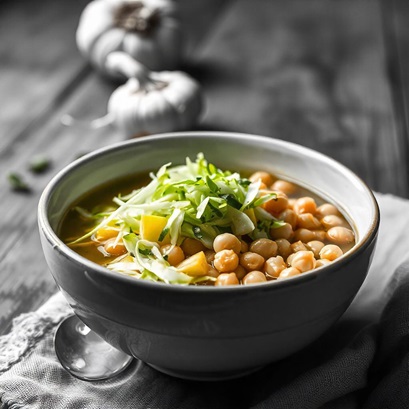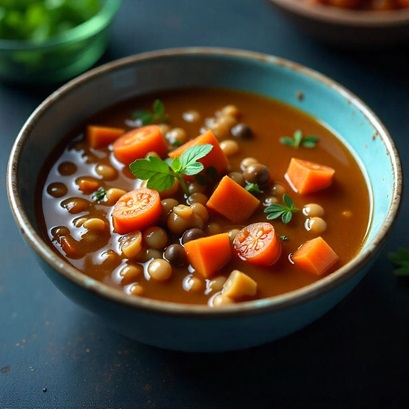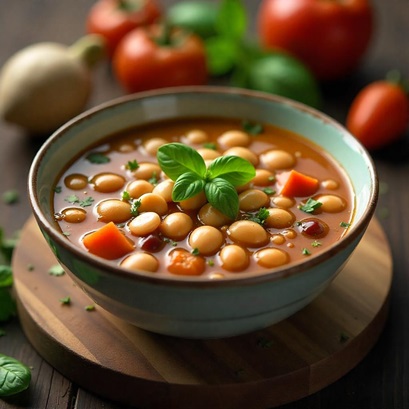High-protein soup recipes are a fantastic way to enjoy a hearty meal while meeting your daily protein needs. Packed with nutrient-dense ingredients, high-protein soups are ideal for building and repairing muscles, supporting weight loss, and fueling your body. Here, we’ll explore the benefits of incorporating high-protein soups into your diet and provide you with 10 delicious recipes that will keep you satisfied and energized.
Benefits of High Protein Soups
High-protein soups are a valuable addition to a balanced diet because they offer multiple health benefits, making them suitable for a wide range of nutritional goals. Here’s why they’re beneficial:
- Muscle Recovery and Maintenance: Protein is essential for repairing and building muscle tissue, which is particularly important after exercise or as part of recovery for those with active lifestyles.
By incorporating high-protein soups, you’re giving your muscles the nutrients they need to repair and grow without relying on heavier meals that might be more difficult to digest.
- Enhanced Satiety: Protein is one of the most filling nutrients, helping to curb hunger by promoting a feeling of fullness for longer periods. This makes high-protein soups ideal for anyone looking to avoid constant snacking or large portion sizes, supporting both weight management and reduced cravings.
- Nutrient-Dense: Alongside protein, high-protein soups typically contain a variety of vegetables, herbs, and sometimes grains or legumes, creating a meal rich in essential vitamins, minerals, and fiber. This nutrient density helps meet daily nutritional needs, supports immune function, and enhances energy levels.
- Weight Management: High-protein soups can play a significant role in weight management, as they’re generally lower in calories and fat than other protein-rich meals. The fiber from vegetables and beans combined with the protein content also means these soups support digestive health, making them satisfying while promoting weight control.
10 High Protein Soup Recipes
1. Power-Packed Protein Veggie Soup
A flavorful blend of fresh vegetables and protein-rich ingredients, this soup is perfect for a nutritious lunch or dinner.

Ingredients:
- 1 cup broccoli, chopped
- 1 cup spinach
- 1 cup carrots, sliced
- 1 cup lentils, cooked
- 1 tsp olive oil
- 1 tsp garlic, minced
- 4 cups vegetable broth
- Salt and pepper to taste
Steps:
- In a large pot, heat the olive oil and add minced garlic. Sauté until fragrant.
- Add the carrots and cook for 3-4 minutes, then add broccoli and spinach.
- Pour in the vegetable broth and bring to a boil.
- Add lentils and simmer for 15-20 minutes until the vegetables are tender.
- Season with salt and pepper before serving.
Benefits: This soup is packed with fiber, vitamins, and plant-based protein from lentils, making it ideal for those following a weight loss meal plan.
2. Muscle Boost Chicken Broth
A soothing, high-protein soup loaded with lean chicken, perfect for muscle recovery meals.

Ingredients:
- 2 cups shredded cooked chicken breast
- 1 cup celery, chopped
- 1 cup carrots, diced
- 4 cups chicken broth
- 1 tbsp olive oil
- Salt and pepper to taste
Steps:
- Heat olive oil in a pot and add celery and carrots, cooking until softened.
- Pour in the chicken broth and bring to a boil.
- Add shredded chicken, reduce heat, and simmer for 10 minutes.
- Season with salt and pepper before serving.
Benefits: This broth provides lean protein essential for muscle building and recovery, along with anti-inflammatory vegetables to promote health.
3. Lean Protein Detox Soup
A light yet filling soup, perfect for a body reset.

Ingredients:
- 1 cup cabbage, shredded
- 1 cup zucchini, chopped
- 1 cup chickpeas, cooked
- 4 cups vegetable broth
- 1 tsp ginger, grated
- Salt and pepper to taste
Steps:
- In a pot, add vegetable broth, ginger, and cabbage, and bring to a boil.
- Add zucchini and chickpeas, then reduce heat to a simmer.
- Cook for 15-20 minutes until vegetables are tender.
- Season with salt and pepper.
Benefits: This soup combines high fiber with plant-based protein, perfect for those looking to boost nutrient-dense soup intake.
4. Creamy Protein Spinach Soup
A creamy, nutrient-dense soup without the extra calories.

Ingredients:
- 2 cups fresh spinach
- 1 cup Greek yogurt
- 1/2 cup green peas, cooked
- 4 cups vegetable broth
- Salt and pepper to taste
Steps:
- Blend the spinach, peas, and yogurt until smooth.
- Pour mixture into a pot, add vegetable broth, and bring to a gentle simmer.
- Season with salt and pepper before serving.
Benefits: Rich in vitamins, minerals, and protein from Greek yogurt, this soup is excellent for a balanced protein-rich diet.
5. Satisfying Protein Lentil Stew
A heartier option packed with plant-based protein and fiber.

Ingredients:
- 1 cup lentils, cooked
- 1 cup tomatoes, chopped
- 1 cup carrots, diced
- 4 cups vegetable broth
- 1 tsp garlic, minced
- Salt and pepper to taste
Steps:
- Sauté garlic and carrots in a pot until soft.
- Add tomatoes, lentils, and vegetable broth, bringing to a boil.
- Simmer for 15 minutes, seasoning with salt and pepper.
Benefits: Packed with fiber and protein, this stew supports digestion and satiety, making it ideal for those on weight loss meals.
6. Energizing Protein Vegetable Soup
A versatile and easy-to-make soup loaded with nutrients.

Ingredients:
- 1 cup kale, chopped
- 1 cup carrots, sliced
- 1 cup quinoa, cooked
- 4 cups vegetable broth
- Salt and pepper to taste
Steps:
- Combine kale, carrots, and broth in a pot and bring to a boil.
- Add quinoa and simmer for 15-20 minutes.
- Season with salt and pepper.
Benefits: With a good balance of protein, fiber, and vitamins, this soup supports energy and fullness.
7. Low-Calorie Protein Power Soup
A light yet satisfying soup perfect for low-calorie diets.

Ingredients:
- 1 cup mushrooms, sliced
- 1 cup kale, chopped
- 1 cup tofu, cubed
- 4 cups vegetable broth
- Salt and pepper to taste
Steps:
- Add mushrooms, kale, and broth to a pot and bring to a boil.
- Add tofu and simmer for 10 minutes.
- Season to taste.
Benefits: This soup provides protein and minimal calories, ideal for low-calorie diets.
8. Protein Boost Bean and Herb Soup
A herby, protein-rich soup perfect for plant-based eaters.

Ingredients:
- 1 cup mixed beans, cooked
- 1 tbsp fresh herbs (parsley, basil)
- 4 cups vegetable broth
- Salt and pepper to taste
Steps:
- Combine beans, herbs, and broth in a pot and bring to a boil.
- Reduce to a simmer and cook for 10 minutes.
- Season to taste.
Benefits: High in fiber and protein, this soup aids digestion and provides lasting energy.
9. High-Protein Garden Delight Soup
A vibrant soup with colorful veggies and plant protein.

Ingredients:
- 1 cup bell peppers, diced
- 1 cup tomatoes, chopped
- 1 cup black beans, cooked
- 4 cups vegetable broth
- Salt and pepper to taste
Steps:
- Add peppers, tomatoes, and broth to a pot and bring to a boil.
- Add black beans and simmer for 10 minutes.
- Season to taste.
Benefits: Rich in antioxidants and protein, this soup is ideal for a healthy, high-protein meal.
10. Metabolism-Boost Mushroom Soup
A simple, metabolism-friendly soup loaded with mushrooms and tofu.

Ingredients:
- 1 cup mushrooms, sliced
- 1 cup tofu, cubed
- 4 cups vegetable broth
- Salt and pepper to taste
Steps:
- Combine mushrooms, tofu, and broth in a pot and bring to a simmer.
- Cook for 15 minutes, seasoning to taste.
Benefits: Low-calorie and protein-rich, this soup supports metabolism and weight management.
Tips for Maximizing Protein in Soups
Boosting protein in soups is simple, and there are various methods to make soups protein-packed without sacrificing flavor or texture. Here are some effective tips:
- Add Protein-Rich Ingredients: Beans, lentils, and tofu are excellent plant-based proteins that easily blend into soups. For meat-based options, lean poultry, ground turkey, or shredded chicken add both protein and heartiness to your soups. Each of these ingredients provides a complete protein profile, especially when combined with grains, making them a well-rounded choice.
- Include Protein Powders: Collagen protein or plant-based protein powders, like pea or hemp, are great options to add protein without impacting the soup’s taste or consistency. Adding a scoop or two is ideal for a protein boost and works well in broths and creamier soups.
- Use High-Protein Grains: Quinoa, barley, and farro are examples of high-protein grains that not only contribute additional protein but also create a satisfying texture and add bulk to the meal. This is particularly effective in soups where a bit more chew is desired.
How Much Protein Should Be in a Meal?
For balanced nutrition, aim for 15-30 grams of protein per meal. This amount supports muscle maintenance and satiety.
Are High-Protein Soups Suitable for Weight Loss?
Absolutely! High-protein soups can be very effective for weight loss because they are nutrient-dense and satisfying without being calorie-dense. Here’s how they aid weight loss:
- Satiety and Caloric Control: Protein keeps you full longer, which means that after a high-protein soup, you’re less likely to reach for snacks or eat excess calories later in the day. This can help create a calorie deficit, essential for weight loss.
- Low-Calorie, High-Volume Foods: Many high-protein soups are based on broth rather than cream, meaning they’re low in calories while still filling due to the volume of liquid, fiber, and protein. Broth-based soups are especially helpful as they allow for a larger serving size without contributing a large number of calories.
- Boosted Metabolism: Protein has a higher thermic effect than fats or carbohydrates, meaning your body burns more calories digesting protein compared to other nutrients. By incorporating high-protein ingredients into your soup, you’re promoting a higher metabolic rate, which can support weight loss goals.
Benefits of High Protein Soups
High-protein soups are a valuable addition to a balanced diet because they offer multiple health benefits, making them suitable for a wide range of nutritional goals. Here’s why they’re beneficial:
- Muscle Recovery and Maintenance: Protein is essential for repairing and building muscle tissue, which is particularly important after exercise or as part of recovery for those with active lifestyles. By incorporating high-protein soups, you’re giving your muscles the nutrients they need to repair and grow without relying on heavier meals that might be more difficult to digest.
- Enhanced Satiety: Protein is one of the most filling nutrients, helping to curb hunger by promoting a feeling of fullness for longer periods. This makes high-protein soups ideal for anyone looking to avoid constant snacking or large portion sizes, supporting both weight management and reduced cravings.
- Nutrient-Dense: Alongside protein, high-protein soups typically contain a variety of vegetables, herbs, and sometimes grains or legumes, creating a meal rich in essential vitamins, minerals, and fiber. This nutrient density helps meet daily nutritional needs, supports immune function, and enhances energy levels.
- Weight Management: High-protein soups can play a significant role in weight management, as they’re generally lower in calories and fat than other protein-rich meals. The fiber from vegetables and beans combined with the protein content also means these soups support digestive health, making them satisfying while promoting weight control.
Tips for Maximizing Protein in Soups
Boosting protein in soups is simple, and there are various methods to make soups protein-packed without sacrificing flavor or texture. Here are some effective tips:
- Add Protein-Rich Ingredients: Beans, lentils, and tofu are excellent plant-based proteins that easily blend into soups. For meat-based options, lean poultry, ground turkey, or shredded chicken add both protein and heartiness to your soups. Each of these ingredients provides a complete protein profile, especially when combined with grains, making them a well-rounded choice.
- Include Protein Powders: Collagen protein or plant-based protein powders, like pea or hemp, are great options to add protein without impacting the soup’s taste or consistency. Adding a scoop or two is ideal for a protein boost and works well in broths and creamier soups.
- Use High-Protein Grains: Quinoa, barley, and farro are examples of high-protein grains that not only contribute additional protein but also create a satisfying texture and add bulk to the meal. This is particularly effective in soups where a bit more chew is desired.
Are High-Protein Soups Suitable for Weight Loss?
Absolutely! High-protein soups can be very effective for weight loss because they are nutrient-dense and satisfying without being calorie-dense. Here’s how they aid weight loss:
- Satiety and Caloric Control: Protein keeps you full longer, which means that after a high-protein soup, you’re less likely to reach for snacks or eat excess calories later in the day. This can help create a calorie deficit, essential for weight loss.
- Low-Calorie, High-Volume Foods: Many high-protein soups are based on broth rather than cream, meaning they’re low in calories while still filling due to the volume of liquid, fiber, and protein. Broth-based soups are especially helpful as they allow for a larger serving size without contributing a large number of calories.
- Boosted Metabolism: Protein has a higher thermic effect than fats or carbohydrates, meaning your body burns more calories digesting protein compared to other nutrients. By incorporating high-protein ingredients into your soup, you’re promoting a higher metabolic rate, which can support weight loss goals.
What Are the Best Protein Sources for Soups?
When it comes to adding protein to soups, certain ingredients stand out for their nutritional quality and versatility. Here are some top sources:
- Lean Meats and Poultry: Chicken breast, lean beef, turkey, and pork are excellent protein sources, providing all the essential amino acids needed for muscle repair and growth. They’re also highly versatile and can be used in a wide variety of soup recipes.
- Legumes and Beans: Black beans, chickpeas, lentils, and split peas are nutrient powerhouses, offering high amounts of protein and fiber while being low in fat. They also blend well in soups, adding texture and depth of flavor.
- Tofu and Tempeh: These plant-based proteins are great options for those following a vegetarian or vegan diet. Tofu absorbs the flavor of the soup broth, while tempeh provides a nuttier taste and denser texture.
- Dairy or Dairy Alternatives: Greek yogurt and cottage cheese can be stirred into soups to add creaminess and a protein boost. For a dairy-free option, protein-fortified plant milks like soy or pea milk are good choices.
- Eggs and Egg Whites: Adding a whisked egg to hot broth (a technique used in Asian egg drop soups) adds a quick protein boost. Egg whites can also be used to increase protein without adding fat.
Conclusion
Incorporating high-protein soups into your diet can support muscle growth, aid weight management, and keep you full and energized. With these easy recipes and helpful tips, you’ll be on your way to enjoying delicious, protein-packed meals every day. Enjoy these high-protein soup recipes as part of your healthy, protein-rich diet journey!


